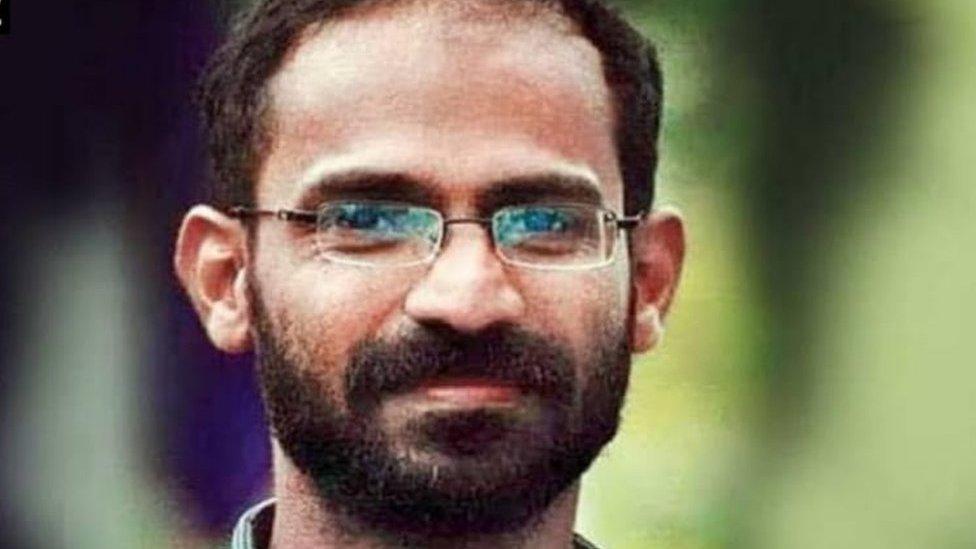Siddique Kappan: Indian journalist released from jail after two years
- Published

Siddique Kappan was arrested while travelling in Uttar Pradesh state in 2020
Indian journalist Siddique Kappan has been released from prison more than two years after his arrest while travelling to report on an alleged rape.
He was arrested in October 2020 in Uttar Pradesh state, where a young Dalit woman had died after she was allegedly raped by four upper-caste men.
The case had sparked protests in India.
Police accused Mr Kappan of conspiring to create law and order trouble and incite violence, which he denied.
Three men who were in the car with him that day were accused of similar offences.
Mr Kappan's arrest was condemned by press freedom activists, who fear India is becoming increasingly unsafe for journalists. Last year, the country dropped eight places and was ranked 150 on the 180-country World Press Freedom Index, compiled by Reporters Without Borders.
"The violence against journalists, the politically partisan media and the concentration of media ownership all demonstrate that press freedom is in crisis in "the world's largest democracy," the report said, external.
Mr Kappan, who had two cases against him, was given bail in one by India's Supreme Court in September. The Allahabad high court granted him bail in the second case in December.
But it took more than a month after that for him to be released due to procedural delays.
On Thursday, after Mr Kappan walked out of the prison in Lucknow city, he said he would continue to fight the charges against him.
"I will also continue to do journalism. I will not sit idle... After all, I am a journalist - where can I run?" he told BBC Hindi's Anant Zanane.
Mr Kappan, who is from Kerala state, was working at Malayalam-language news portal Azhimukham when he was arrested on his way to Hathras district in Uttar Pradesh.
After his arrest, he accused the police of physically and mentally torturing him. His family also alleged that authorities did not give him access to his medicines for diabetes.
The police denied the allegations.
They have claimed that Mr Kappan and his companions were members of the Popular Front of India (PFI), a Kerala-based radical Muslim group that was banned last year for alleged links with terror groups. The PFI, Mr Kappan's lawyer and a Kerala-based journalist union he belonged to have denied this.
Mr Kappan's lawyer told the BBC in 2021 that his client was initially charged with "minor bailable offences".
But two days later, the police added other charges including sedition and provisions under a stringent anti-terror law which critics say makes it almost impossible to get bail.
In February 2021, the Enforcement Directorate, which investigates financial crimes, filed another case against him under the Prevention of Money Laundering Act. The central agency said that Mr Kappan received money from PFI to "incite riots", a charge he denied.

Read more India stories from the BBC:
